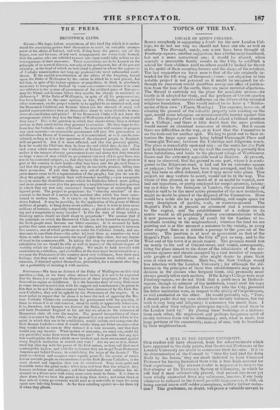LOCALE OF KING'S COLLEGE. TOPICS OF THE DAY.
SINCE everybody is suggesting a locale for the new London Col- lege, we do not see why we should not have our site as well as others. The Borough, surely, can never have been thought of. Finsbury-square, another suggestion, has a better neighbourhood, but not a more convenient one : it would be absurd, when scarcely a mercantile family resides in the City, to establish a school for their children (and no others could be looked for there) in the midst of their counting-houses and the shops of the retailers. The last suggestion we have seen is that of the site originally in- tended for the left wing of Somerset-House: our objection to this notable project is not personal as it might be imagined, for al- though its execution would doubtless sweep our office of publica- tion front the face of the earth, there are more material objections. The Strand is certainly not the place for academic groves—its bustle is ill adapted for study, and the purlieus of Covent-garden might have an unfavourable influence on the 616ves of the intended religious foundation. This would indeed be to have a " Stinko- melee of their own." (Times, Monday.) The expense, however, of clearing the ground of the valuable property now existing on the spot, would alone interpose an insurmountable barrier against this plan. The Regent's Park would indeed ailbrd a brilliant situation for a College ; and there is little doubt that the mere position would secure an abundant concourse of students. But it seems there are difficulties in the way, or at least that the Committee is on the look-out for another spot. We beg to point out to their at- tention the large open space lying behind Connaught Place and Connaught Terrace, between the Uxbridge and Edgeware roads. The place is remarkably open and airy : on the south lies tiee Park and Kensington Gardens ; on the west the county is peafectly free from habitations, and leads to the pleasant village of Westbourne Green and the extremely agreeable road to Harrow. At present, it may be observed, that the ground in one part, where it is coati. guous to the Edgeware road, is laid out for an extensive square or polygon ; but the plan has been long arranged, and the build- ing has been so often deferred, that it may never take place. This project, we may venture to assert, would not be in the way. The whole of this ground, or as much of it as might be wanted, now laid out in pasture, or partly employed for carpet-grounds, belong- ing as it does to the bishopric of London, the present Bishop of which is said to be the most active promoter of the new institution, might no doubt be placed at the disposal of the Committee. Here would be a noble site for a splendid building, and ample space tar every description of garden, walk, or exercise-ground. The Regent's Park is at present an ornament and a convenience to the capital, and the establishment of a college in its centre would in all probability destroy recommendations which it now possesses as a place of resort for the families of in- dividuals residing in the neigbourhood; whereas the land we are pointing out is at this moment a nuisance to the vicinity, in every other respect than as it affords a passage to the pure air of the country. The position is at least as convenient as that of the Regent's Park : access from the City ijust as easy, and to the West end of the town it is much nearer. The grounds would run up nearly to the end of Oxford-street, and would, consequently, bring the place almost to the doors of the inhabitants of the nu- merous squares and streets occupied by a vast number of respect- able people of small fortune who might desire to place their sons at such an institution. Here too, the New College would less interfere with the London University ; for although the dif- ference in the principles of these two establishments may make a division in the classes who frequent them, still proximity must always greatly tell in such matters. If the King's College were near Finsbury-square, we do not think that a gentleman in Bedford- square, though an admirer of the institution, would send his boys past the doors of the London University into the City, provided the latter institution were, in respect to the ability of the professors, • as well conducted as the other. He would probably say, "True, I should prefer that my sons should hear divinity lectures, but the walk is very long and fatiguing; it consumes too much i time. I will look alter their religious principles myself, and send them to the London hard by." By placing these buildings at a distance from each other, the unpleasant and perhaps dangerous spirit of rivalry between them will be diminished; and, what is more, two large portions of the community, instead of one, will be benefited by their neighbourhood.


















 Previous page
Previous page